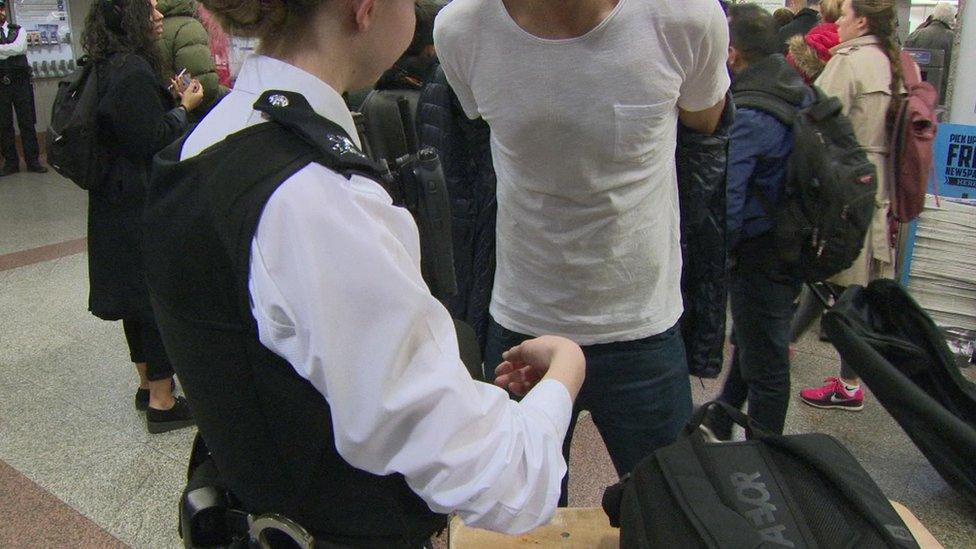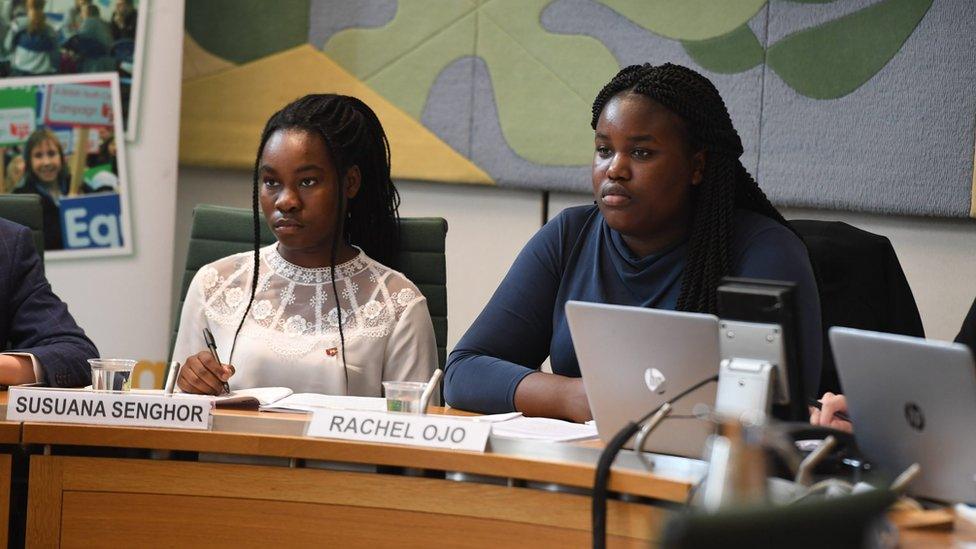Violence fears make children miss school, youth survey suggests
- Published

Jibril Rose, 19, from London, feels trust needs to be rebuilt between young people and authorities like the police
Fear of violence made a fifth of children miss school at least once in the last year, a survey by the Youth Endowment Fund, external (YEF) suggests.
Results from the survey of over 7,500 children indicate 16% of children aged 13-17 have been a victim of violence.
The children's commissioner said knife crime and violence was the "number one issue" raised with her by young people.
A government spokesperson said it was providing targeted support to areas with the highest levels of violence.
For Jibril Rose, now 19, school was "perfectly fine" but things got "a bit dangerous" when he headed home.
"I grew up in North London and there was a lot of gang culture there, gang rules there, so I had to go certain routes home to avoid hotspots," he said.
Understanding experiences like Mr Rose's is at the heart of the work done by YEF, a charitable trust formed in 2019 with a £200m Home Office endowment to help prevent youth violence, external.
Its executive director, Jon Yates, said: "One of the most important things that we need to do as adults is understand what's going on in the lives of our children in this country."
'Use of force'
The trust's research, conducted online with survey provider Walr, found 1,244 (16%) of the 7,574 respondents in England and Wales had been a victim of violence in the last 12 months.
The survey, external defined violence as "the use of force or threat of force against another person or people", including sexual assault.
Of those who took part, 1,533 children (20%) had skipped school at some point in the last year due to feeling unsafe.
Department for Education data shows state-funded secondary schools had an overall absence rate of 8.5% in the 2022-23 spring term.
The Children's Commissioner, Dame Rachel de Souza, said when she speaks to children, "the number one issue they raise is knife crime and violence".
She said she has spoken to many children aged 8-13 who are "underage on social media sites and that's where they first see real violence".

The survey suggests 47% of those aged 13-17 have been a victim or witness of violence in the past year
Direct feedback from young people on issues such as these is used by YEF to help shape its decisions and Mr Rose is among those who sit on its Youth Advisory Board.
Fellow advisory board member Ajada Bridges-Matthew, 23, from Leicester, said she felt social media helped violence "spread across the country".
"If you see [it] on social media and it's accessible to you every day, then [you] automatically assume it's the norm," she said.
Mr Rose agreed, adding: "We tend to see that the viral clips are the ones where something insane is happening, something mad is going on."
Of the 1,244 survey respondents who said they were victims of violence, almost half said they had also perpetrated it.
Mr Yates said: "If we have traumatic, violent experiences, we may well act out in a violent way. So what do we do about it? Well, the first thing is, we start by recognising we're talking about children. These are not adults."
'Building relationships'
Most perpetrators (58%) said no one in authority learnt about the violence they had committed, while only 16% were offered support or training to control their behaviour.
Mr Rose said that "growing up, a lot of the times we didn't call the police when stuff happened because we didn't trust the police" but one teacher "saved a lot of my friends".
He added: "Him being a black teacher, he's gone through what we've gone through."
Chief Constable Catherine Roper, the National Police Chiefs' Council's lead for children and young people, said "building relationships with young people is a vital element in community policing".
She said the organisation was working with YEF on a study to evaluate the use of police in schools.
A government spokesperson said "nothing is more important than the safety of children".
They said Violence Reduction Units - introduced in 2019 - had reached over 215,000 vulnerable young people through early intervention programmes in their third year alone.
The spokesperson said schools in areas with the most serious violence were also getting funding for alternative provision and taskforces to support to at-risk pupils, with the aim of keeping them engaged in education.
Related topics
- Published15 July 2019

- Published12 February 2020

- Published2 February 2022
